
Article
Students understanding of test statistics in hypothesis testing
20th Annual Conference on Research in Undergraduate Mathematics Education
(2017)
Abstract
Hypothesis testing is a key concept included in many introductory statistics courses. Due to common misunderstandings of both scientists and students, the use of hypothesis testing to interpret experimental data has received criticism. This paper describes preliminary results obtained from a larger study designed to investigate introductory statistics students’ understanding of one sample hypothesis testing. APOS theory is used as a guiding theoretical framework. Preliminary data analysis focused on two students’ distinctions between test statistics when performing hypothesis tests on real world data. The results suggest a significant difference in these two students’ understanding, one being identified having an action conception while the other had an object conception of hypothesis testing as situated in the study.
Keywords
- Hypothesis Testing,
- Statistics,
- Test Statistics
Disciplines
Publication Date
February 25, 2017
Citation Information
Annie Burns-Childers, Darryl Chamberlain, Aubrey Kemp, Leslie J. Meadows, et al.. "Students understanding of test statistics in hypothesis testing" 20th Annual Conference on Research in Undergraduate Mathematics Education (2017) Available at: http://works.bepress.com/darryl-chamberlain/7/
